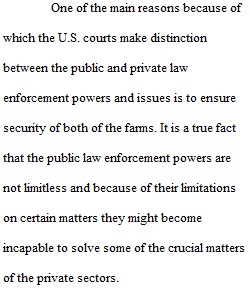


Q EXERCISE #1 - SECURITY OPERATIONS AND THE LAW The “Scope of Legal Authority of Private Security Personnel” is a 1976 document written by the Private Security Advisory Council of the United States Department of Justice to identify for private security operatives the various sources of legal authority and the legal issues with which they will be confronted while performing their various duties protecting organizational assets. “The Law of Arrest, Search, and Seizure: Applications in the Private Sector” is sample text chapter published by Elsevier that presents a comprehensive discussion of legal requirements for private security arrests and searches. After reviewing these documents any other independently researched source, explain why the U.S. Courts continue to make distinctions between public law enforcement powers and private sector enforcement issues. Incorporate into your response why a practical knowledge of the law is important to the corporate security officer and the security director and what impact criminal and tort law has on a corporation. REMEMBER: Be sure to cite your sources from both the Learning Materials and outside research. EXERCISE #2 - SECURITY SCENARIO LEGAL APPLICATIONS GROUP A - Students whose last name begins with the letters A-M must post initial responses to this discussion question. All others should read and comment as a part of their weekly engagement with their colleagues. Police Moonlighting Civil Case: Cervantez v. J.C. Penney Company, 156 Cal. Rptr. 198 1978 This civil case was filed against an off-duty police officer employed by J.C. Penney in a secondary job as a store detective who made a warrantless arrest of two misdemeanor offenders for theft. The case was eventually dismissed and the offenders were released. The “moonlighting” officer and J.C. Penney were sued for false arrest, assault and battery, negligence, and other intentional torts. This case has a number of implications for security directors who employ police officers in their security program operations. After reading the case, respond to the following: (1) Succinctly summarize the facts of the case regarding the arrest and any subsequent judicial action, if any. (2) Describe the issues the court had to settle and the legal arguments the plaintiff and the defendant advanced to the court in support of their respective positions. (3) Explain the court's ruling and its rationale. (4) Identify the ways this type of organizational and personal liability can be avoided. REMEMBER: Be sure to cite your sources from both the Learning Materials and outside research.
View Related Questions